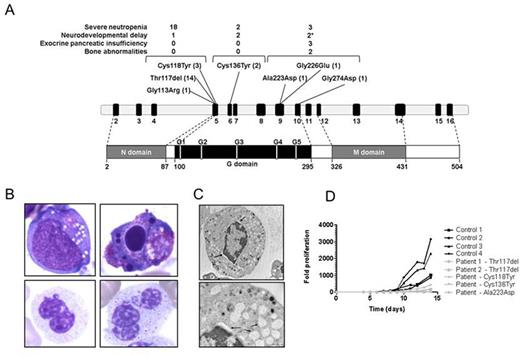Abstract
Context. Congenital neutropenia (CN) is a heterogeneous group of diseases characterized by low neutrophil count, severe bacterial infections, increased risk of leukemic transformation and various extra-hematopoietic organ dysfunctions. Even if 24 different genes have been linked to the etiology of CN, in many patients the genetic causes of CN remain unknown.
Methods. Whole-exome sequencing (WES) was performed on a trio-based approach in 8 sporadic cases and 6 multiplex families. Sanger sequencing was performed in a second phase on 66 additional patients from the French CN registry. Structural and functional studies were performed using primary cells from patients including fibroblasts and hematopoietic cells. In vitro granulocytic differentiation was conducted by culturing CD34+ in serum-free medium with SCF, IL-3 and G-CSF for 21 days.
Results. WES analysis identified a heterozygous mutation in the SRP54 gene, encoding the signal recognition particle (SRP) 54 GTPase protein, in 3 sporadic cases and an autosomal dominant family. Considering these results we directly sequenced SRP54 in the French CN cohort and identified 13 additional sporadic cases and 2 multiplex families, thus reaching a total of 23 cases carrying a SRP54 mutation (19 families, Figure 1A). The Thr117del in-frame deletion was found in 12 probands. In all patients, neutropenia was profound (mean neutrophil absolute count 0.23x109/L), diagnosed in the neonate period or during childhood (mean age 4.2 months), and required long-term G-CSF therapy (mean dose 9 µg/kg/day). Bone marrow examination showed a maturation arrest at the promyelocytic stage. In contrast to CN associated with ELANE mutations, SRP54-mutated patients presented an important degree of dysgranulopoiesis (abnormal localization and number of mature granules) and enlarged endoplasmic reticulum (ER) in promyelocytes as well as dystrophic neutrophils (Figure 1B-1C). No evolution into acute myeloid leukemia was observed in this cohort after a median follow-up period of 14.8 years despite high doses of G-CSF. Six out of the 23 patients had extra-hematopoietic manifestations comprising severe neurodevelopmental delay (n=5) and/or exocrine pancreatic insufficiency (n=3), and/or bone abnormalities (n=2) (Figure 1A).
The SRP54 protein is a key component of the ribonucleoprotein complex SRP that mediates the co-translational targeting and the insertion of secretory and membrane proteins to the ER. We identified 7 distinct mutations that affect highly conserved residues within or interacting with G motifs involved in the GTPase activity of SRP54. Of note, 17 out of 18 patients with mutations located within the G1 element and predicted to affect the structure and/or stability of the NG domain presented only a severe neutropenia. In contrast, the other 5 patients with mutations affecting either the magnesium-binding or the guanine-binding site and/or implied in the heterodimeric association with the receptor of SRP54, were associated with Shwachman-Diamond-like syndrome features. During the in vitro granulocytic differentiation of both normal and mutated hematopoietic progenitors, we found a strong increase in SRP54 mRNA expression levels associated with a slight decrease in the protein level in patients compared to controls. Moreover, SRP54 mutations induced a major deleterious effect on proliferation (Figure 1D) and a delay in the differentiation associated with increased apoptosis. Using both in vitro-derived granulocytic cells and primary fibroblasts, we also observed that SRP54 mutations led to ER stress (increased eIF2a phosphorylation, XBP1 splicing, ATF4 and CHOP expression) and enhanced autophagy (higher levels of LC3-II and ULK1 expression).
Conclusions. This study thus identifies a novel pathological pathway implicating the co-translational process of protein targeting. This new genetic subtype which represents the second cause of CN in the French registry (prevalence 6.9%), is characterized by a promyelocytic maturation arrest with dysgranulopoiesis leading to a profound neutropenia, with a poor response to G-CSF, and in few patients, is associated with severe neurodevelopmental delay and exocrine pancreatic insufficiency.
No relevant conflicts of interest to declare.
Author notes
Asterisk with author names denotes non-ASH members.


This feature is available to Subscribers Only
Sign In or Create an Account Close Modal